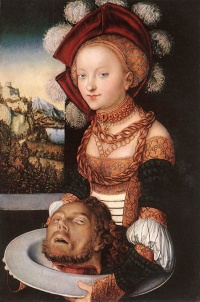Female crime
From The Art and Popular Culture Encyclopedia
|
Related e |
|
Featured: |
Gender is a factor that plays a role in both human and animal aggression. Males are generally more aggressive than females (Coi & Dodge 1997, Maccoby & Jacklin 1974), and men commit the vast majority of murders (Buss 2005). This is one of the most robust and reliable behavioral sex differences, and it has been found across many different age groups and cultures. There is evidence that males are quicker to aggression (Frey et al 2003) and more likely than females to express their aggression physically (Bjorkqvist et al. 1994). However, some researchers have suggested that females are not necessarily less aggressive, but that they tend to show their aggression in less overt, less physical ways (Bjorkqvist et al. 1994, Hines and Saudino 2003). For example, females may display more verbal and relational aggression, such as social rejection.
Contents |
In fiction: the femme fatale trope
The Femme Fatale, the vamp, La belle dame sans merci, the Black Widow, the Dragon Lady is a beautiful, seductive, but (traditionally) evil woman who leads the hero to his doom. Examples include:
- Lady Macbeth
- the Dragon Lady from Terry and the Pirates
- many women ("bad girls") in film noir, see "bad girl movies"
In more modern fiction, femme fatales aren't necessarily evil, but are simply women who use their looks and female charisma to get what they want. More often, they are protagonists, supporters of protagonists, antiheroes, or villains who switch sides, rather than all-out antagonists. Examples include_
In film
Real life evil women
- Mary I of England
- Myra Hindley
- Isabella of Castile
- Beverly Allitt
- Belle Gunness
- Mary Ann Cotton
- Ilse Koch
- Irma Grese
- Katherine Knight
- Elizabeth Bathory
See also
- Feminist school of criminology
- Gender and crime
- Black widow
- list of women who have murdered their husbands
- Mariticide
- Female serial killer
- Criminal Woman, the Prostitute and the Normal Woman (1893) - Cesare Lombroso, Guglielmo Ferrero


